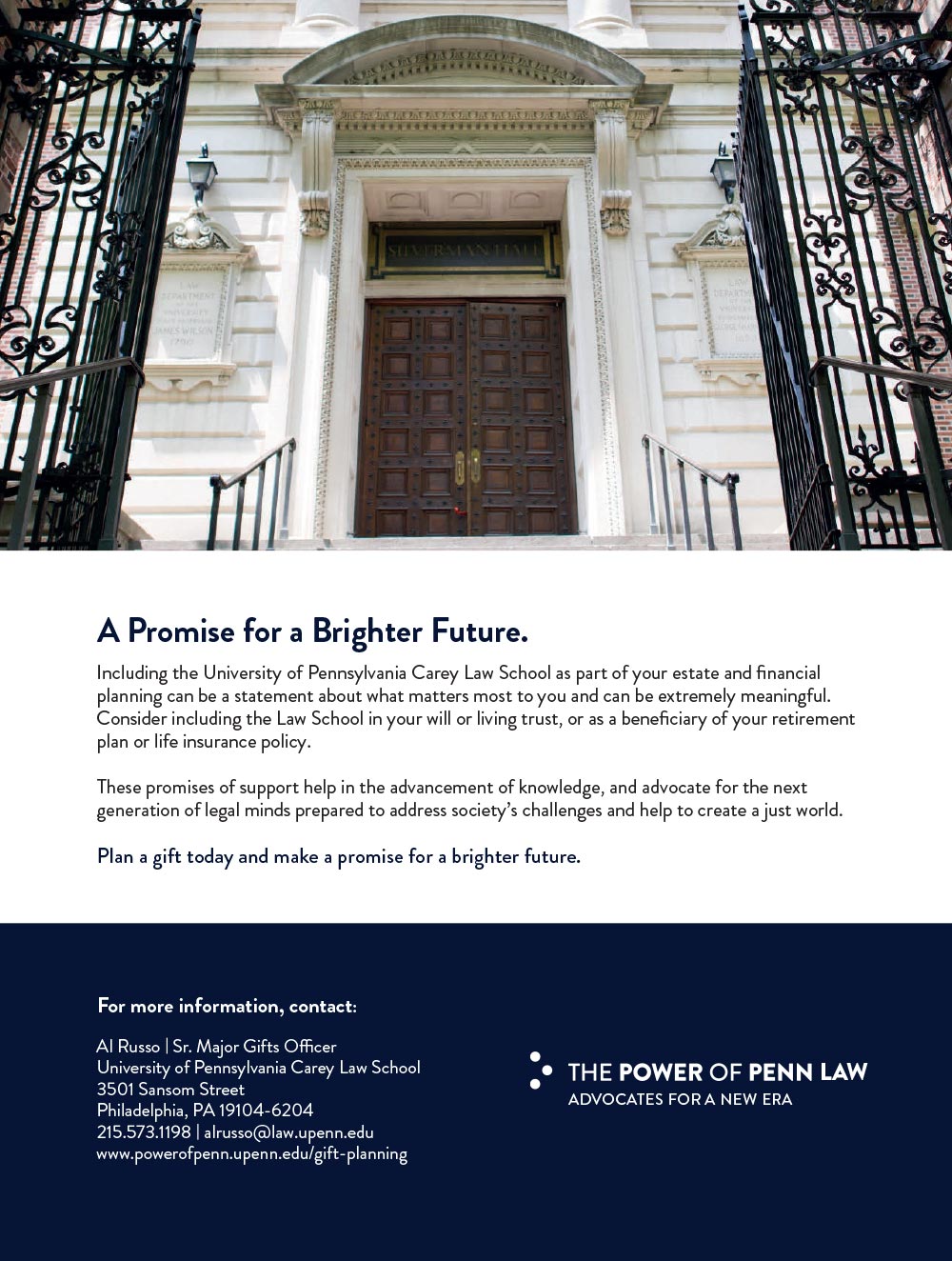Penn Law Journal Summer 2021

pennsylvania
carey law school
Summer 2021
carey law school
Summer 2021

Larry Teitelbaum
Design
Landesberg Design
Senior Contributing Writer
Lindsay Podraza
Contributing Writers
Alexander Gelfand
Aisha Labi L’96
Andy Maynard
Ian Mikrut
Catharine Restrepo L’93
Photography
Charles Shan Cerrone
Eve Edelheit
Sameer Khan
Colin Lenton
Sonya Revell
Website
law.upenn.edu/alumni/alumnijournal/
Keep in Touch
Send news and photos to the attention of the editor.
Corrections
Every effort has been made to ensure accuracy. We offer our sincere apologies for any typographical errors or omissions. Please forward any corrections to the attention of:
Larry Teitelbaum
Editor, Penn Law Journal
University of Pennsylvania
Carey Law School
3501 Sansom Street
Philadelphia, PA 19104
Telephone 215 573 7182
Fax 215 573 2020
Email alumnijournal@law.upenn.edu
Connect with Penn Law
Law School Website law.upenn.edu
Twitter @PennLaw
Facebook facebook.com/pennlaw
LinkedIn linkedin.com/school/university-of-pennsylvania-carey-law-school
The University of Pennsylvania values diversity and seeks talented students, faculty and staff from diverse backgrounds. The University of Pennsylvania does not discriminate on the basis of race, color, sex, sexual orientation, gender identity, religion, creed, national or ethnic origin, citizenship status, age, disability, veteran status or any other legally protected class status in the administration of its admissions, financial aid, educational or athletic programs, or other University-administered programs or in its employment practices. Questions or complaints regarding this policy should be directed to the Executive Director of the Office of Affirmative Action and Equal Opportunity Programs, Sansom Place East, 3600 Chestnut Street, Suite 228, Philadelphia, PA 19104-6106; or (215) 898-6993 (Voice) or (215) 898-7803 (TDD).




José Cil L’94 worked his way up to lead Restaurant Brands International, the parent company of Burger King, Popeyes, and Tim Hortons.
From The Dean
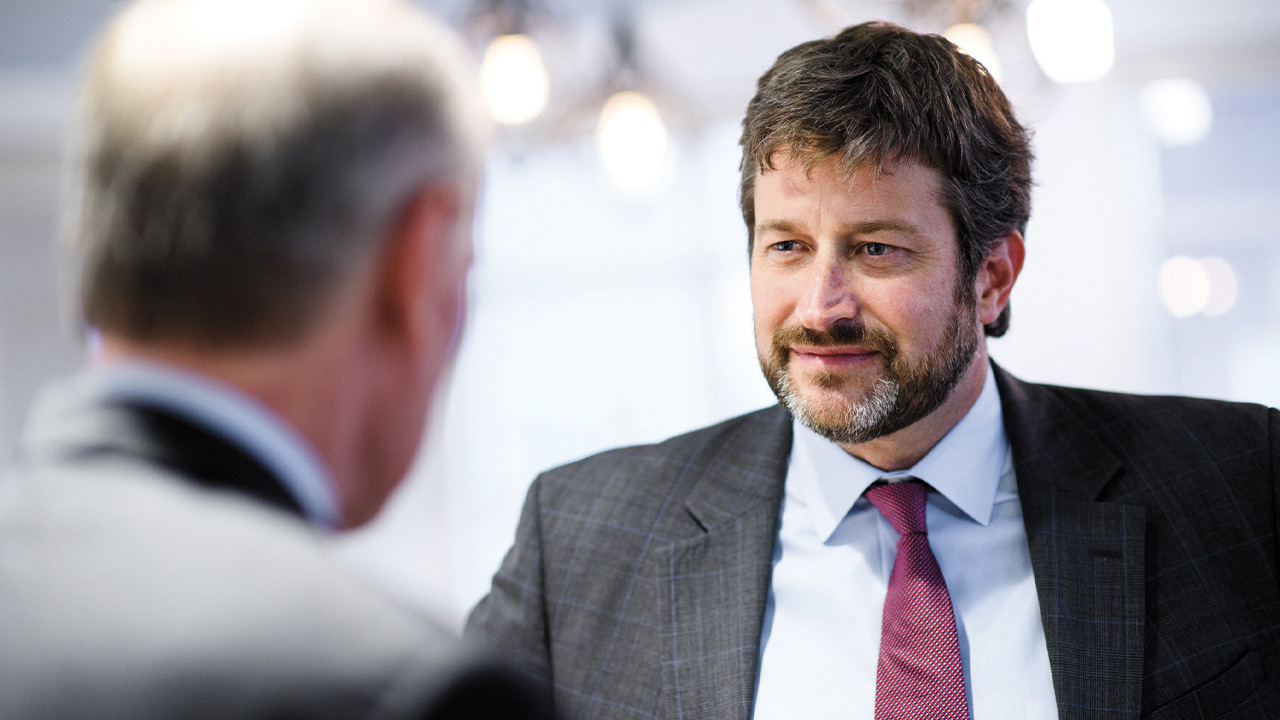
In the Journal cover story titled “The Future of Medicine” we detail the remarkable efforts of five alumni who, armed with their legal educations, have been thinking about and putting into action new paradigms for healthcare.
Aretha Delight Davis L’97, CGS’05 created a comprehensive and collaborative model for end-of-life decision-making; Marie Hurabiell L’96 helped devise a transformative new method for mental health treatment using artificial intelligence and the power of speech; Anthony Mazzarelli L’03, GR’03 imagined a more efficient and cost-effective way to deliver hospital services; Kiran Musunuru ML’19 developed a potential magic bullet for heart disease; and Adam Vandervoort L’99 helped pave the way for the rapid growth of telemedicine.
Over the last year we have seen how crucial it is to have a well-functioning, creative healthcare system. The pandemic stretched resources to the limit. The Law School was not immune. Our students, faculty, and staff were tested as we scrambled to put in place a reliable infrastructure that would allow the Law School to continue to provide a world-class legal education. (See page 6 for a recap of some of our efforts.)

#pennLaw
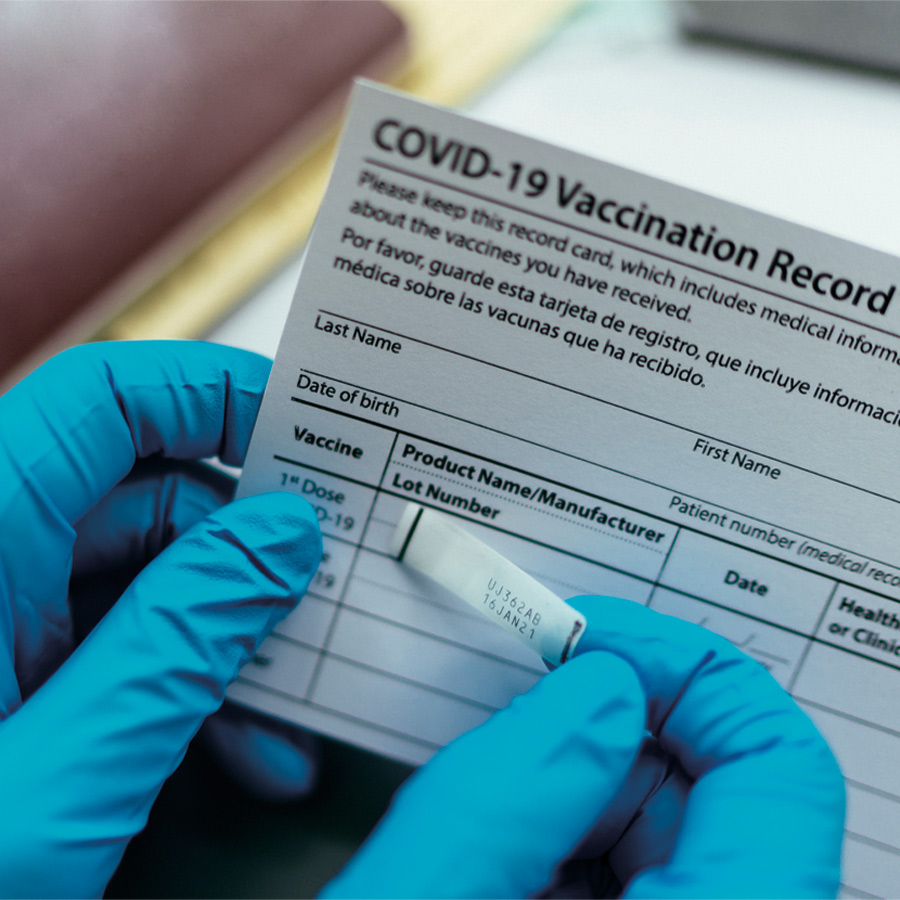
Prof. @COFinkelstein explains how the Biden Administration is defending Trump’s sweeping view of executive privilege: pennlaw.news/3fG9xu2
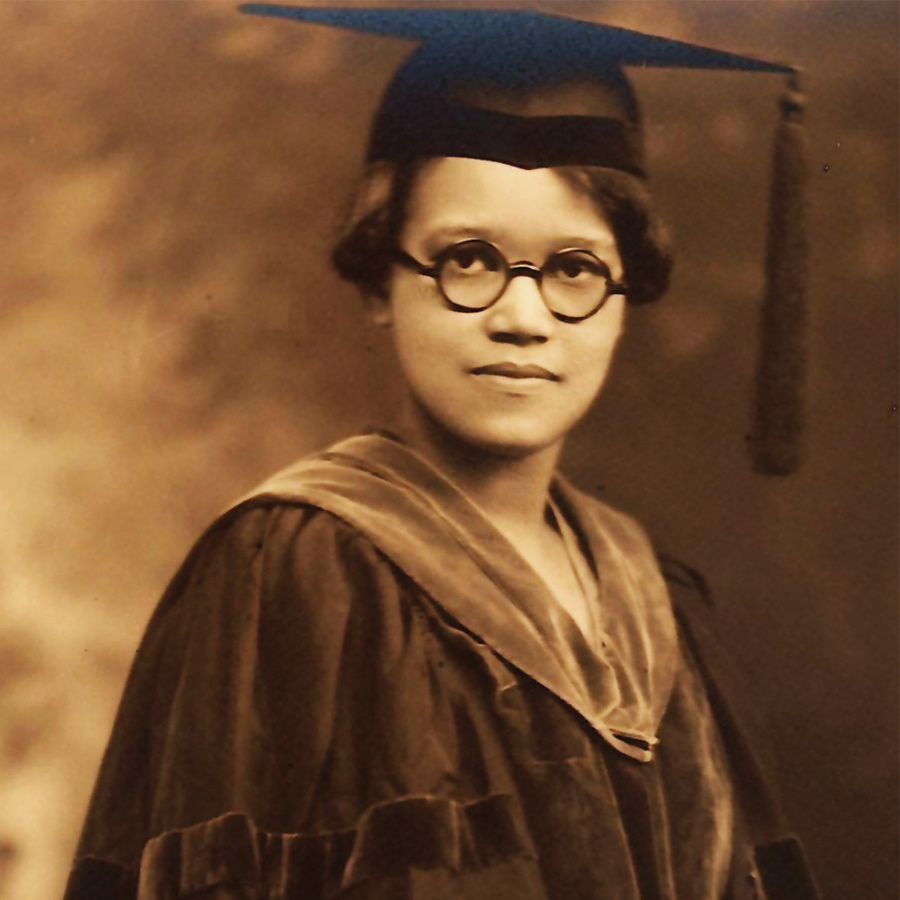

John H. Chestnut Professor of Law, Communication, and Computer & Information Science
#pennLaw


Prof. @COFinkelstein explains how the Biden Administration is defending Trump’s sweeping view of executive privilege: pennlaw.news/3fG9xu2

John H. Chestnut Professor of Law, Communication, and Computer & Information Science
U.S. Chief District Judge Juan Sánchez L’81 and other federal judges highlight the critical role of citizens in maintaining public trust in the justice system. go.usa.gov/xHsJg



Federalism, Now More Than Ever
In crafting our constitutional arrangement, the Framers chose a political union that divides power between a central government and member sovereigns. Federalism, they believed, was the best way to ensure a harmonious union between separate states with distinct cultures and political preferences. Yet over the past century, our political system has become increasingly centralized, with the federal government prescribing one-size-fits-all policy in some of the most contested areas of public discourse, like healthcare, education, and entitlements. The consequences of this consolidation are palpable — our country is politically fractured, with diverse sectors of society straining under the weight of policy dictated by distant lawmakers unacquainted with the needs of their constituents. By returning power to the states — those same powers expressly reserved to them under the Tenth Amendment — we can hope for some semblance of harmony.
While the Constitution clearly envisions a federal system, American federalism is, in part, the result of historical happenstance. Our democratic republic took form from thirteen colonies that came together as thirteen independent states. But the Framers were intentional in their decision to preserve the arrangement, believing that government that is closer to the people it serves is more effective.
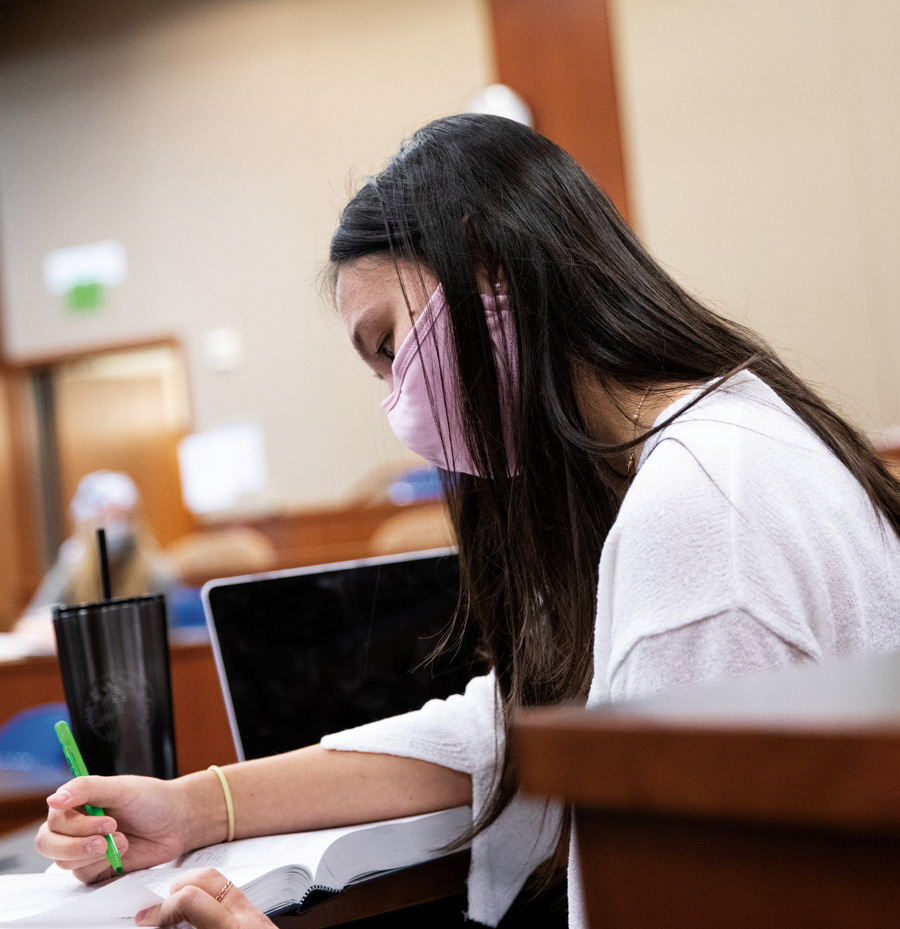

With high expectations, the Law School prepares for full in-person program in the Fall.
State of the Law School: ‘Flexible and Nimble’ During Pandemic
About sixty percent of students chose the in-person option. Ruger said he expects most JD students back on campus in the Fall as the Law School returns to near-normal operations.
“We don’t know exactly how Fall 2021 is going to look,” Ruger said in a State of the Law School presentation, acknowledging the uncertainties of the pandemic. “We certainly hope that it’s going to be better than Fall 2020 or Spring 2021.”
The Law School — which has had no in-building person COVID transmission — is certainly well-prepared for the return of most staff, students, and faculty given the resilience and adaptability on display during the past year of the pandemic, with Dean of Students Felicia Lin characterizing Law School leadership, students, and the faculty as “flexible and nimble.”
The Quattrone Center Launches Website to Help Prosecutors Set Up Conviction Review Units
“Conviction review units help promote the highest ideals of our criminal justice system, and jurisdictions across the country want to know how to create them and make them effective,” said Marissa Bluestine, Assistant Director at the Quattrone Center. “Convictionreview.net fills the need for a single, comprehensive resource where prosecutors can go to learn about best practices to implement, find templates they can use to develop strong policies, or even just to help them think through the difficult issues that exist in this space.”
The site is a one-stop-shop for materials and templates, a wide variety of information regarding best practices, and guidance for working with victims and surviving victims’ families. All resources and materials available on the website are free to anyone interested in reviewing best practices, although particularly aimed at prosecutors who need them.
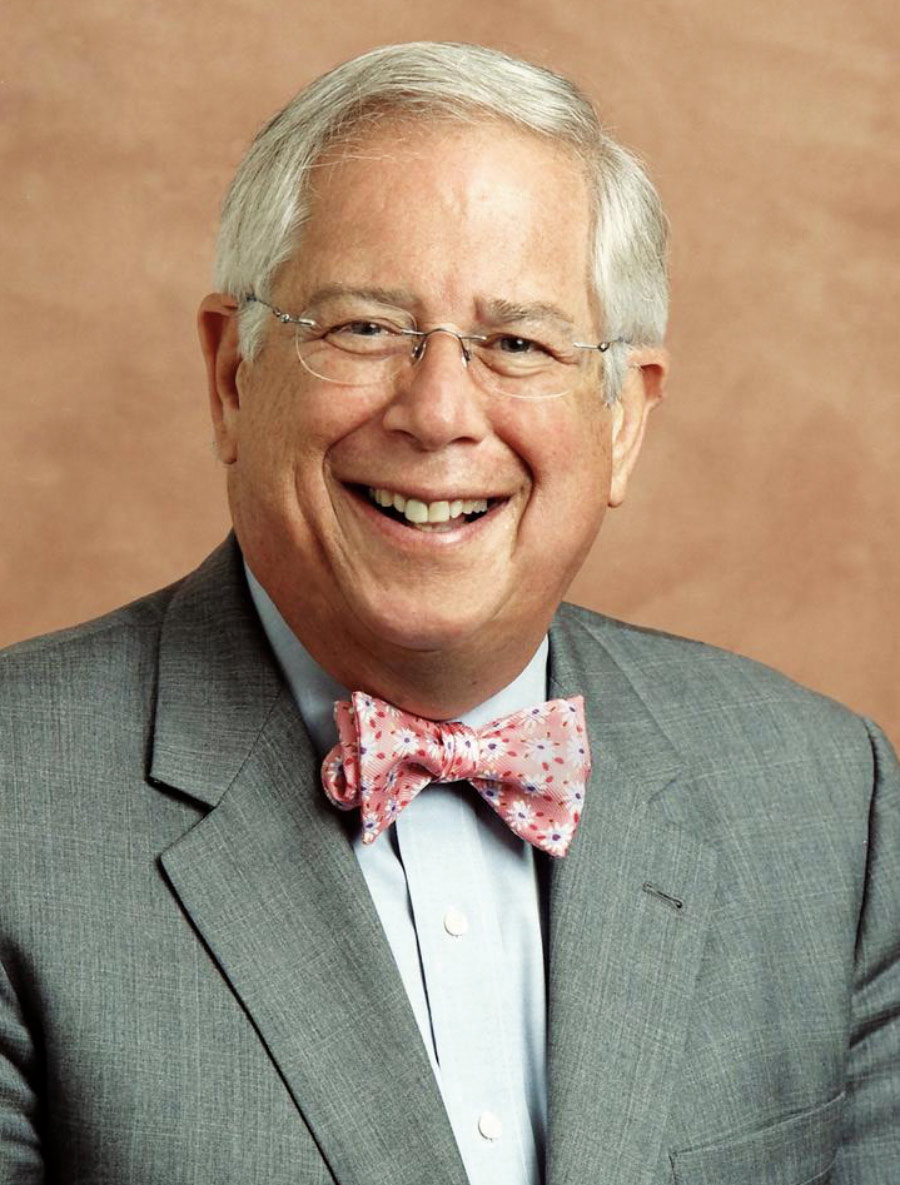

Lawrence Fox C’65, L’68 recognized for his dedication to legal ethics and professional responsibility and his service to the ABA.

Lawrence Fox Receives the ABA Medal, the American Bar Association’s Highest Honor
Fox received the ABA Medal at the virtual General Assembly on August 4, the opening day of the ABA 2021 Hybrid Annual Meeting.
The ABA Medal recognizes exceptionally distinguished service by a lawyer or lawyers to American jurisprudence and is given only in years when the ABA Board of Governors determines a nominee has provided extraordinary service to the legal profession.
“As a practitioner, pro bono volunteer, law professor and national bar leader, Larry Fox has distinguished himself as one of the giants of the legal profession,” ABA President Patricia Lee Refo said. “In addition to his decades of service to the American Bar Association, Larry has been a leading voice on legal ethics and professional responsibility, has taught and mentored countless law students, and consistently done impactful pro bono work, particularly in the area of death-penalty representation. In more than a half century of legal work, Larry has exemplified the highest standards and ideals of the legal profession.”
The ABA also recognized Fox’s distinguished record of service to the association, which includes longtime membership in the House of Delegates and helping to launch the forerunner to ABA Day in D.C., the association’s annual grassroots lobbying event on Capitol Hill. Fox also has held top leadership posts of the Standing Committee on Ethics and Professional Responsibility, the Commission on the Evaluation of the Rules of Professional Conduct, the ABA Death Penalty Representation Project and the Section of Litigation.
Fox is recognized nationally as one of the most active ABA participants in contributing to issues relating to lawyer and judicial conduct and has taught professional responsibility for three decades, lectured at more than 35 law schools on the same topic and written or co-written eight books on professional responsibility with Professor Susan Martyn. He is a longtime veteran of securities regulation and litigation matters and former partner at Drinker Biddle & Reath LLP before joining Schoeman Updike Kaufman & Gerber LLP in New York. He is also a Fellow of the American College of Trial Lawyers and the American Bar Foundation and serves on multiple corporate boards of both for profit and not-for-profit entities.
The Story of the Trailblazing Defender Association of Philadelphia Runs Through Penn Law
The veteran Philadelphia Inquirer journalist, however, had limited knowledge of the city’s legal affairs. “When I was at the Inquirer, I did a lot of things, but never courts and never government,” Schaffer said.
That quickly changed as the two collaborated on The Defender: The Battle to Protect the Rights of the Accused in Philadelphia, recently published by Temple University Press. Although Madeira, longtime Chairman of the Association’s board died in May 2020 at the age of 92, he was pleased with the final manuscript of the book, Schaffer said.
Telling the Defender’s story, Schaffer discovered, not only put the spotlight on the organization that today operates as Philadelphia’s public defender office, but also on the Law School.
“One of the most fascinating things was that Penn Law School had a very important role,” he said. “In the early days in the ’60s, Penn Law School had a lot to do with the direction the Defender took.”


New book details the rich history of the Defender Association of Philadelphia and its enduring connection to the Law School.


New book details the rich history of the Defender Association of Philadelphia and its enduring connection to the Law School.
The Story of the Trailblazing Defender Association of Philadelphia Runs Through Penn Law
The veteran Philadelphia Inquirer journalist, however, had limited knowledge of the city’s legal affairs. “When I was at the Inquirer, I did a lot of things, but never courts and never government,” Schaffer said.
That quickly changed as the two collaborated on The Defender: The Battle to Protect the Rights of the Accused in Philadelphia, recently published by Temple University Press. Although Madeira, longtime Chairman of the Association’s board died in May 2020 at the age of 92, he was pleased with the final manuscript of the book, Schaffer said.
Telling the Defender’s story, Schaffer discovered, not only put the spotlight on the organization that today operates as Philadelphia’s public defender office, but also on the Law School.
“One of the most fascinating things was that Penn Law School had a very important role,” he said. “In the early days in the ’60s, Penn Law School had a lot to do with the direction the Defender took.”

Staniunas is Queen Bee of Bee Project in Uganda
ix years ago, Marianne Staniunas L’04, a lawyer-turned-honey buyer-turned-lawyer again, took a summer sabbatical in Uganda to prop up a new apiary in the heart of the rain forest in the western part of the country.
Little did she know that this would become, as she describes it, like a second job, from which she derives unending satisfaction and fulfillment. “I love every aspect of it … I fell in love with the community as soon as I visited. I love Uganda.”
As a volunteer for the Kasiisi Project, a nonprofit organization whose mission is to preserve Kibale National Park through the education of schoolchildren and other members of the community, Staniunas has been working with volunteers, staff and community partners to train staff, to raise money to support the purchase and upkeep of what is now 70 to 80 hives, and to monitor ongoing climate-change-related research on bees.
As the remote manager of the bee project, which entails daily contact with staff, she also coordinated the development of a bee curriculum for grade school children in Uganda that teaches young students, as part of conservation education, the role of bees as pollinators, the function of hives, and the medicinal qualities of honey.
Panelists Decry Continued Lack of Diversity in Legal Profession
During the webinar titled “The Future of Racial Equity in the Profession,” fellow panelist and high-profile trial attorney Don Prophete discussed a call to action he issued in a letter to general counsels, asking, “Will they again provide my people of color scraps and meaningless amounts of work or will they step up and offer real and lasting change? Do you hear the chimes of the changing times? Will you stop your complicity in the asphyxiation of black legal careers? Right now is the time for action. Please, no more shallow excuses.”
The letter was his attempt to convey his disappointment and anger at the profession, said Prophete, a partner at Constangy, Brooks, Smith & Prophete LLP. Breaux, Associate Counsel at Vanguard and Co-Lead of the firm’s Diversity Committee, moderated the panel discussion, which, in addition to Prophete and Caine, Vice President of Burford Capital, included journalist Vivia Chen and Ulrich Stacy, CEO of the Diversity Lab.
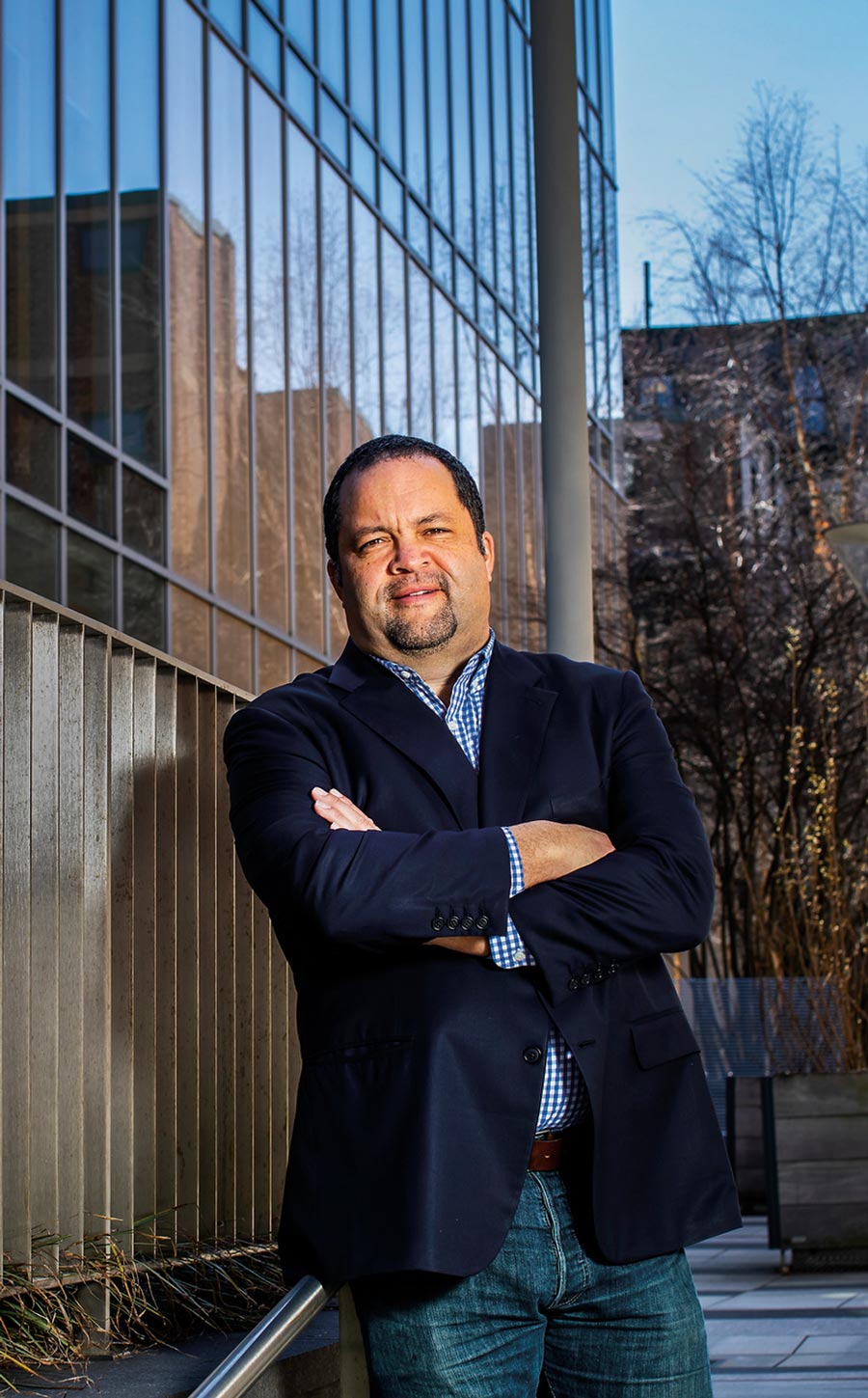

Former President of the NAACP Ben Jealous shared his life story during Public Interest Week.
How a Birthday Party Shaped Benjamin Jealous’ Fight for Civil Rights
“I walked out of the party at that point. The notion that it was an accomplishment for a member of any group, let alone my own group, to simply breathe past their 21st birthday cut me like a knife,” said Jealous, a 2021 Honorary Fellow in Residence at the University of Pennsylvania Carey Law School and President For The American Way.
That birthday party started Jealous, who in 2008 at age 35 was chosen as the youngest-ever president and CEO of the NAACP, on a lifetime of advocacy for the Black struggle for equality and freedom. He shared his story as a guest speaker during the Law School’s Annual Public Interest Week, organized by the Toll Public Interest Center, the hub of public service at the Law School. Soon after the party Jealous met with his family’s griot, his now 104-year-old grandmother, Mamie Todd SW’53, for counsel.
Why, he asked, after the promise of the Civil Rights movement, did his generation find themselves the most incarcerated people on the planet and the most murdered in the country.
She explained: “We got what we fought for but we lost what we had. We got the right to send our children to any school in town. We lost the right to assume that they would be loved or welcomed the way that I was welcomed at the one-room schoolhouse that [my] grandfather built for his children, and his grandchildren and those of other people who had been born into slavery.”
She added Black people gained the right to work in law enforcement but lost the right to live in safe communities.
On the bus back to Columbia, Jealous determined to make his cause ending the injustice in the justice system. That’s how he found himself in Mississippi at age 20 working as an organizer with Stacey Abrams and others.
(Abrams, former Georgia gubernatorial candidate, minority leader of the Georgia House of Representatives and activist against voter suppression, joined Jealous during the spring semester for a conversation sponsored by the Annenberg School for Communication, the Law School, the Stavros Niarchos Foundation Paideia Program, and the Penn Provost’s Office. See page 16.)

Democratic star and voting rights activist Stacey Abrams advocates bottom-up organizing to reform gerrymandering and redistricting if Washington doesn’t act.
A Conversation with Stacey Abrams
After Stacey Abrams lost the 2018 Georgia governor’s race, she said she was “the saddest I’ve ever been and the most worthless I’ve ever felt.” She gave herself 10 days to grieve, watch TV, feel depressed and mad, and then she transformed those emotions into action.
“Ambition doesn’t allow itself to be rewarded by not getting what you want. Sometimes it’s an opportunity to expand how you think about it, or understand what you need to do differently,” she told the virtual audience in a conversation at Penn. “I got through those bouts by remembering why I do it, remembering my job isn’t to win; it is to move forward.”

Osagie Imasogie LLM’85 is humbled and thrilled for the opportunity to spread the word about the Law School.
New Chair of Board of Advisors Seeks More Buzz About the Law School
Imasogie is a leader in the pharmaceutical industry, having held positions at GSK, SmithKline, DuPont Merck, and Endo. He is Chairman and Founder of Zelira Therapeutics, Ilera Holdings and Ilera Holistic. In this interview, Imasogie, with his trademark ebullience, expresses unalloyed optimism about the future of the Law School.
When I was approached, I was quite thrilled and humbled that I would be considered for the role. I am grateful that the Law School is in a very good place, in terms of infrastructure, faculty, and funding. We have done well in the (fundraising) campaign. However, we can always do better.
Four Distinguished Faculty Members Retired from the Law School in 2021
Four distinguished faculty members retired from the University of Pennsylvania Carey Law School at the end of the 2021 academic year: William A. Schnader Professor of Law Regina Austin L’73; David Berger Professor for the Administration of Justice Stephen B. Burbank; Charles A. Heimbold, Jr. Professor of Law Charles W. Mooney Jr.; and John J. O’Brien Professor of Law & Professor of Philosophy Stephen R. Perry.
Each of these professors has contributed immensely to the Law School community during their time; three have served for over 30 years. Their work embodies a wealth of scholarly and experiential expertise that has greatly enhanced the academic programming, education, and mentorship of our students, while their achievements in research and scholarship stand as valuable additions to the legal landscape.

Regina Austin L’73, William A. Schnader Professor of Law

Regina Austin L’73, William A. Schnader Professor of Law
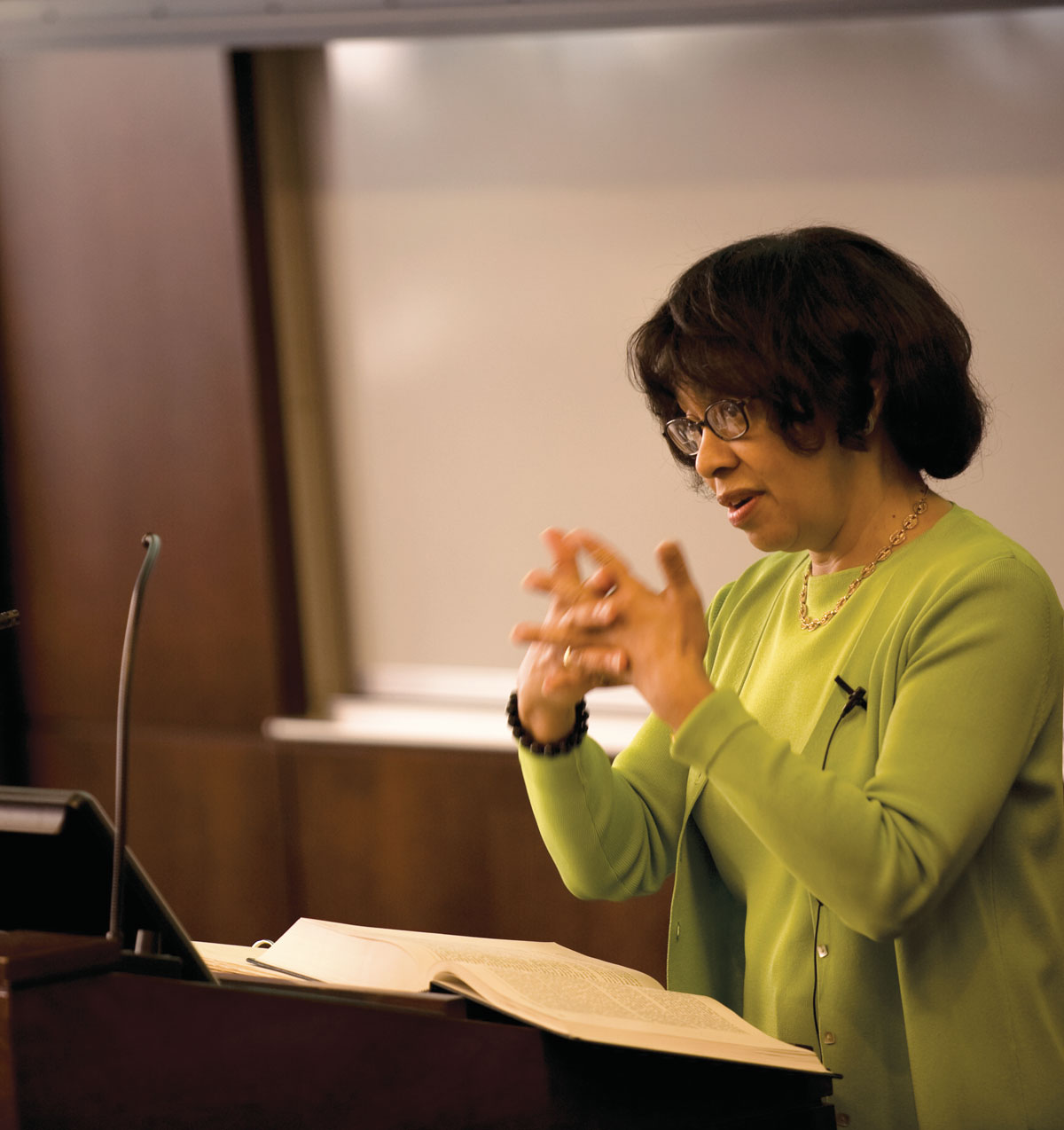
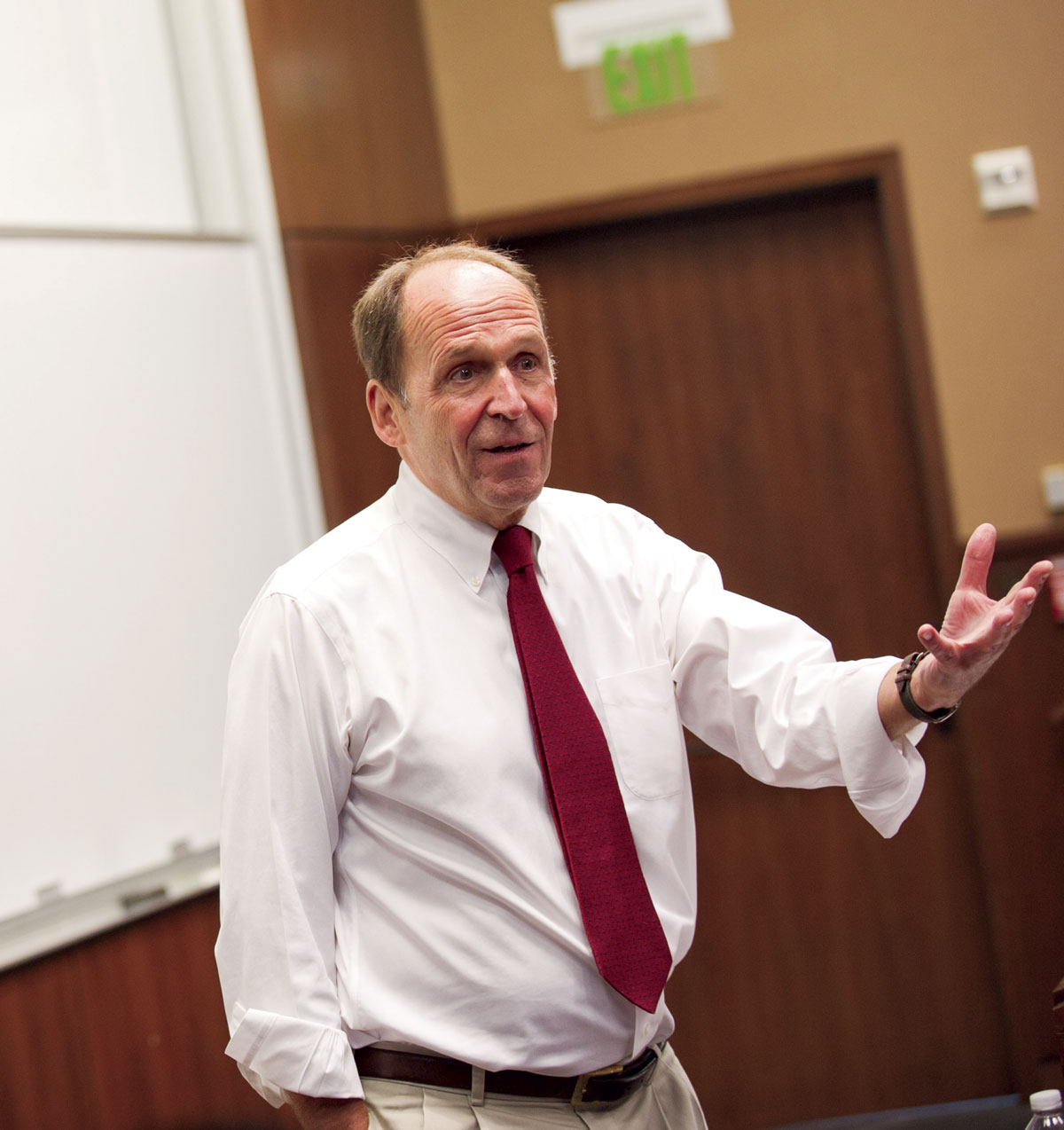

Stephen B. Burbank, David Berger Professor for the Administration of Justice

Stephen B. Burbank, David Berger Professor for the Administration of Justice
Regina Austin L’73
William A. Schnader
Professor of Law
Austin began teaching at the Law School as an Assistant Professor in 1977. Her scholarship focuses on the impact of law on cultural conflicts arising from race, gender, and class inequality, with much of it revolving around the critical analysis of ethnographies and law-genre documentary films and photography.
“To be an academic is to be a perpetual student,” said Austin. “Thus, I expect my education to continue in retirement. By both doing and writing, I hope to learn more about visual legal advocacy, critical participatory qualitative research in the law, and the ethical implications of both.”

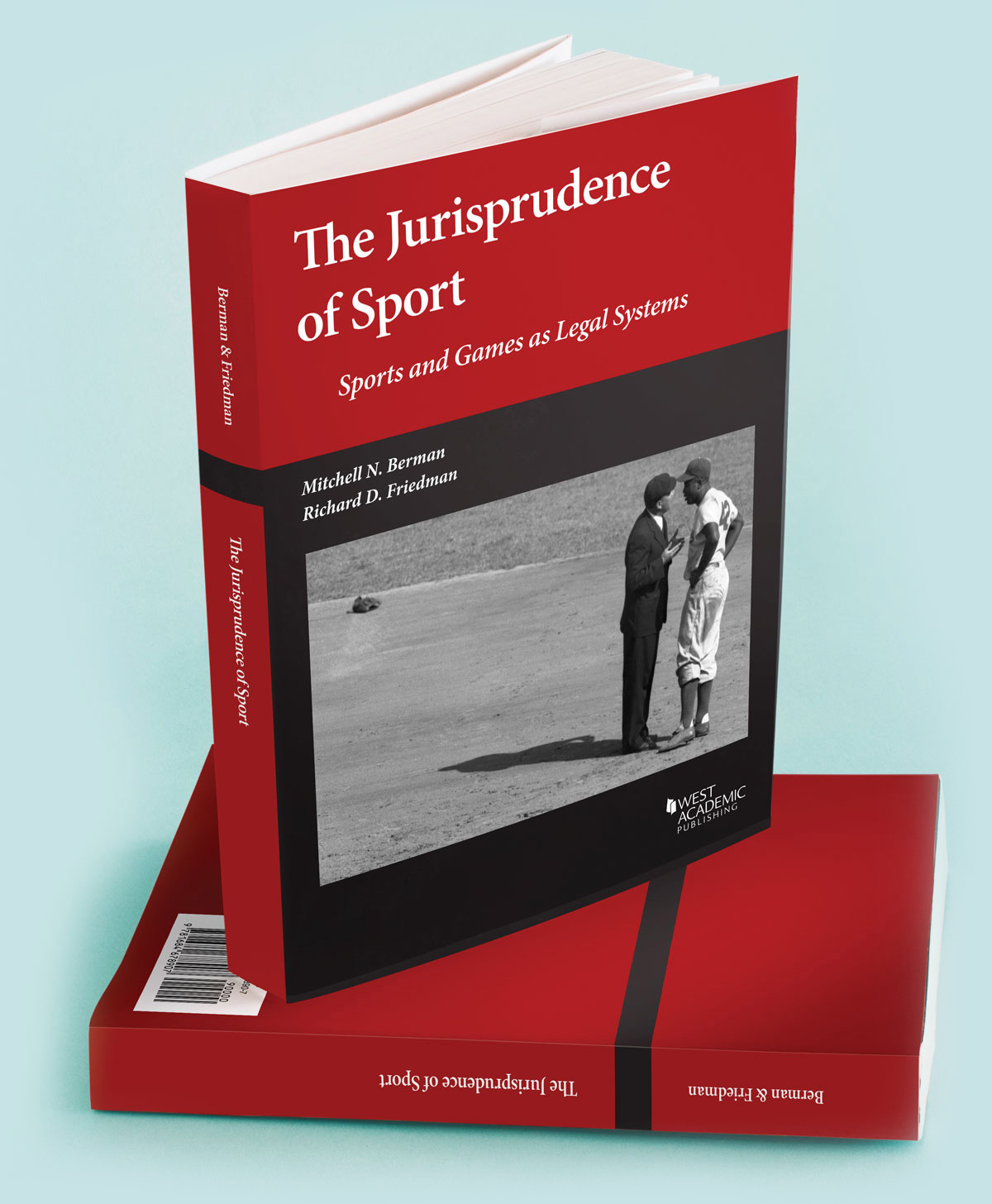
The Jurisprudence of Sport: Sports and Games as Legal Systems
West Academic Publishing
Professor Mitchell Berman, who coined the phrase the “Jurisprudence of Sport” and is the leading figure in this developing field of academic study, has co-authored a first-of-its-kind textbook on the subject.
The book treats sports as worthy of legal theoretical study not only for law students but also for undergraduates, offering an introduction to legal thinking that does not require a background in legal doctrine.
The text covers everything from baseball, football, soccer and boxing to eating competitions and cornhole in chapters on scoring systems, penalties, league structure, player eligibility, officiating, replay review, and cheating.
The book, which raises questions and contains a full range of exercises, is meant as a roadmap for professors on how to teach the jurisprudence of sports in a way that is both fun and rigorous, focusing on fundamental concepts and more technical areas of the law such as rules versus standards and prices versus sanctions. Students are also introduced to topics in more cognate disciplines. These include agency costs, the Coase Theorem and psychological biases and heuristics.
Virtual Reunion Connects Classmates in Week-Long Series of Events
With pandemic safety precautions still in place preventing in-person events on the Law School campus, Reunion took place in a virtual setting, providing an opportunity to host events beyond the weekend timeframe as held in the past.
Milestone Reunion Classes included those who graduated from the Law School in 2016, 2011, 2006, 2001, 1996, 1991, 1986, 1981, 1976, and 1971. In addition to substantive virtual programs and individual class year events, digital viewbooks were made available for participants to share personal and career highlights with their classmates.
“It was great to connect with my classmates, even virtually,” said Sierra Shear L’16. “While nothing can replace seeing each other in person, it was so nice to be able to reminisce and catch up after five years.”
Those classes celebrating major milestone anniversaries displayed resilience in making the most out of virtual gatherings, with some excitement around the potential to combine the best elements of utilizing new technology to add new layers to future, in-person events.
The
Future
of
Medicine
That’s exactly what five Law School alumni are doing as they work on solutions to a strained health care system sorely in need of reforms — proving once again that if you want to get the job done with forward thinking, in any field, just turn to Penn Law graduates.

Musunuru Seeks the Holy Grail: A Cure for the World’s Number One Killer
met Kiran Musunuru, ML’19 when he was a student in Penn Law’s Master in Law program, a Penn Law degree launched in 2014 for non-lawyers, providing targeted legal education to industry leaders and accomplished academics, professionals and Penn students to enrich their important work by studying the law impacting their fields and enabling innovation. Musunuru’s timing was excellent, coinciding with his efforts to launch and raise capital for Verve Therapeutics, which is developing a vaccine for heart disease.
Cardiovascular disease leads the world in death and misery. Eighteen million lives lost each year and immense suffering for those living with this insidious disease, make it a true pandemic, the greatest global public health crisis of the twenty-first century, exceeding by multiples cancer (9 million deaths annually) and COVID-19 (2.5 million deaths in the first year). It is an indiscriminate killer, knowing no gender, racial, geographic, or socioeconomic boundaries. Worse still, it is rising again, ready to explode, Musunuru believes, with increased obesity, diabetes, pollution, and tobacco use abruptly reversing what had been a positive trend.
One-third of those who suffer heart attacks do not receive help in time and die. For the survivors, quality of life is diminished, requiring interventions or expensive medication, all with attendant challenges. Scientific advances help, but never make the victim whole again after suffering a heart attack. Lack of adherence to prescribed medication leads to future heart attacks. Inequity prevails as access and costs widen the gap in health outcomes between rich and poor.

Finding Justice at the End of Life
ad news is never easy to hear. And when it comes in the form of a serious medical diagnosis, where those on the receiving end are tasked with making big decisions in a situation that can be frightening and confusing, the potential ripple effects can have far-reaching consequences.
For terminally ill patients and their families, or anyone navigating the often-complex nature of healthcare in general, the idea of making uninformed decisions about significant medical procedures or treatment plans for themselves or loved ones can be a harrowing experience. But it doesn’t have to be.
“Shared decision making is a bi-directional conversation,” said Dr. Aretha Delight Davis L’97, CGS’05. “The clinician may be the expert when it comes to the science, but the patient is really the expert of the values that are important to them. And it’s only when they come together, and they have this bi-directional conversation, that they can proceed forward. Appreciating a patient’s autonomy and insights informs us as clinicians and plays a really important role.”

The Future is Now for an App That Offers On-the-Spot Mental Health Assessment
llipsis Health, which leverages your smartphone to help you understand your emotional health anytime, anywhere, might seem like something out of a TV show set in the distant future. However, no wires or sensors are required. The app uses the power of your voice to quantify depression and anxiety symptoms based on your answers to a few questions and provides recommendations for managing mental health conditions. For Marie Hurabiell L’96, an early investor and member of the founding team and the board of directors for Ellipsis Health, which was founded by her fiancé Mainul Mondal and Michael Aratow, MD, this technology is not out of another reality — it is happening right now.
Ellipsis Health began in 2017 with the idea of employing a new diabetes treatment. Soon after the company grew into something different altogether: a method to diagnose and treat mental illness through the use of artificial intelligence technology.
“The idea of the company is that we are the vital sign for mental health,” Hurabiell said. “A way to screen, measure, and monitor your mental health in a way that is analogous to how you would measure blood pressure or temperature.”

Driven by Pressure to Cut Costs, Hospitals Shift More Care to Satellite Sites
s a frontline medical professional and senior healthcare executive, Anthony Mazzarelli L’03, GR’03 enjoys a unique perspective on the long-term outlook for hospital operation.
Mazzarelli practices emergency medicine in Camden, NJ. He is also Co-President/CEO of Cooper University Health Care (CUHC), a leading provider of health services across South Jersey and the Delaware Valley. As such, he helps lead the organization that runs Cooper University Hospital, where he practices; Children’s Regional Hospital at Cooper; MD Anderson Cancer Center at Cooper; and the Cooper University Physicians faculty practice plan.
From his vantage point as both practitioner and administrator, Mazzarelli sees hospitals morphing gradually into more expansive organizations like CUHC, where more and more care is provided on an outpatient basis. It’s a transformation that is being driven both by the high cost of inpatient hospital care and by changes to the reimbursement models that determine how hospitals get paid.

With Use of Technology, Teladoc Pioneers a New Kind of House Call
n the early years of the Internet start-up boom at the turn of the century, an engineer-physician in Texas saw a future for something called telemedicine, a foreign notion in the conservative world of healthcare, which is sometimes slow to embrace new technology.
It must have seemed crazy at the time, much in the way that selling books over the Internet struck people in publishing as folly. But, nearly 20 years later, Teladoc Health, Inc., is riding a wave as more and more patients sign on to a new model of medicine: virtual doctor visits.
Aided by the pandemic, during which patients have been reluctant to visit doctors in person, Teladoc reported a 156 percent increase in total visits in 2020 over the previous year, translating to 10.6 million remote visits. And, according to McKinsey & Company, 76 percent of consumers are now interested in trying virtual care, as compared to 11 percent prior to COVID-19.

The Burger King
By Aisha Labi L’96
No, Cil had not been fired from the legal team at Burger King Corp., which shortly before had been acquired by a private equity consortium. Rather, he had decided to stop practicing law to work on the company’s operations side. He had kept the move quiet, confiding in only a few people, including his father. The elder Cil, who died in 2016, had been in the restaurant business, rising from an hourly job to become a district manager for Lum’s, a once-ubiquitous Miami-based casual dining chain. He knew the grueling hours and unflagging commitment the work required and his reaction to his son’s news that he was leaving the security of practicing law and following him into the business of running restaurants was blunt: “Are you crazy?”
Vietnam
Revisited
The pandemic forced an immediate all-hands-on-deck conversion from in-person learning to virtual education. The terrorist attacks in 2001 fostered crisis counseling and a sustained discussion about the rule of law and civil liberties. The 2008 recession tested the Law School’s model of preparing students to succeed beyond their first job in an ever-changing profession that proved susceptible to economic pressures.
In this issue, we revisit the Vietnam era a half-century later. It was a time when students re-examined their values as the draft loomed over them and the country came apart. By Larry Teitelbaum
Vietnam
Revisited
The pandemic forced an immediate all-hands-on-deck conversion from in-person learning to virtual education. The terrorist attacks in 2001 fostered crisis counseling and a sustained discussion about the rule of law and civil liberties. The 2008 recession tested the Law School’s model of preparing students to succeed beyond their first job in an ever-changing profession that proved susceptible to economic pressures.
In this issue, we revisit the Vietnam era a half-century later. It was a time when students re-examined their values as the draft loomed over them and the country came apart. By Larry Teitelbaum
eter Marvin C’68, L’72 saw the writing on the wall when President Johnson eliminated the graduate school deferment. Indeed, Marvin received a notice from his draft board before he even completed his undergraduate studies at Penn informing him of his 1A status upon graduation. Until then, he had planned to enter Penn Law School in the Fall. Instead, he took what we would now call a gap year and joined the Army Reserve, committing himself to a six-year hitch. He would submit to six months of basic training, monthly meetings and two weeks of drills every summer. In his mind, a fair exchange if it kept him out of Vietnam.
He arrived on campus a year later as a “conscientious acceptor,” a term of art coined in The New York Times to describe reservists who made their peace with part-time military service. In a matter of months, the war and accompanying protests turned deadlier with the invasion of Cambodia and the killing by the National Guard of four Kent State students who were protesting the war on campus.
It all reached a boiling point with the approach of final exams in the Spring of 1970. Marvin remembers the conflicting emotions swirling at the Law School. The escalation and murders consumed the energies of many Penn Law students, to the point where they felt exams were an afterthought, especially with a huge protest planned in Washington around the same time.
“There was a significant feeling among a number of students that this was an important time to be demonstrating, to be lobbying our senators and representatives,” recalled Marvin, a longtime small firm and solo practitioner and former adjunct professor at the Law School who taught Common Law Contract for Civil Lawyers to LLM students. “There were more important things going on than taking law school exams.”
Former Army ROTC Cadet Recounts Clashing with Faculty on Campus Recruitment
As to increased U. S. bombing of Cambodia, there may well have been discussions round and about The Goat.
Final exams were, I believe, just a few weeks away in our respective dreads.
My recollection, such as it is: Some students and Bernard Wolfman held the view that finals should be postponed to protest the Nixon administration’s illegal and unconscionable actions. Postponement was to be an act of conscience.
I am told by a classmate that I spoke in opposition to the postponement, on the grounds that it would impose disruptions on the family commitments and travel plans of others; would disrupt the interview and job opportunities of others.
SPAC Master

A pivotal moment of rejection in the summer of ’66 would inspire her to trailblaze a path in business, finance and law. Cohen was concluding her term as a summer associate at a big law firm, where she had excelled. She remembers sitting in the hiring partner’s office. “He looked three shades of green and said to me that … our senior partner says he’s not ready to have a woman work at the law firm as a professional,” Cohen said. “I was simply astounded. It had never occurred to me that such a thing could happen to me, so I just looked at him and said, ‘I think it’s your loss.’ And I walked out.”
While it’s not a particularly fond memory for Cohen, the experience taught her an invaluable lesson: “I really determined at that moment that … I really would do better not working for somebody else that could make decisions on my behalf, so I didn’t. And I never have.”
SPAC Master

A pivotal moment of rejection in the summer of ’66 would inspire her to trailblaze a path in business, finance and law. Cohen was concluding her term as a summer associate at a big law firm, where she had excelled. She remembers sitting in the hiring partner’s office. “He looked three shades of green and said to me that … our senior partner says he’s not ready to have a woman work at the law firm as a professional,” Cohen said. “I was simply astounded. It had never occurred to me that such a thing could happen to me, so I just looked at him and said, ‘I think it’s your loss.’ And I walked out.”
While it’s not a particularly fond memory for Cohen, the experience taught her an invaluable lesson: “I really determined at that moment that … I really would do better not working for somebody else that could make decisions on my behalf, so I didn’t. And I never have.”


Campaign
News
Cozen Family Makes Gift in Support of Voting Rights
The timing of this fellowship is important as there is a growing need for advocacy to increase voter participation, access, and protection at the federal and state legislative levels, particularly as some states attempt to subvert voter protection mechanisms and Congress attempts to pass new and expansive federal voting legislation.
“Establishing this fellowship provides an important opportunity for our graduates to use their degrees to work in the critical areas of voter participation, access, and protection — in which there is currently much effort to restrict,” said Dean and Bernard G. Segal Professor of Law Ted Ruger. “The generosity and vision of the Cozens to help meet this moment ensures the Law School’s continued commitment to access to justice for all, including protecting the ability and right to vote.”
Class Notes


The Hon. Harold Berger EE’48, L’51, PAR’80 was honored by a Special Philadelphia City Council Resolution recognizing his public service and contribution to academia and the national legal community. At Penn, Judge Berger, a World War II Army veteran, serves on the Board of Advisors of the School of Engineering and Applied Science, as Chair of the Friends of Biddle Law Library, and as a member of the Executive Board of The Center of Ethics and The Rule of Law at the University of Pennsylvania Carey Law School. He was the recipient of the inaugural Lifetime Commitment Award of Penn Law. Among items recognized were his service as Chair of the National Committee on the Federal and State Judiciary of the Federal Bar Association, his service as a Judge of the Common Pleas Court of Philadelphia and his receipt of the Special Service Award of the Pennsylvania Conference of State Trial Judges. Judge Berger also served as Chair of the Aerospace law Committees of the American, Federal and Inter-American Bar Associations, chaired the International Conferences on Global Interdependence at Princeton University and was elected to the International Academy of Astronautics in Paris. A Co-Founder and Managing Partner Emeritus of Berger & Montague, Judge Berger is a recipient of a National Achievement Award from Marquis Who’s Who in America and Marquis Who’s Who in American Law. He is a lifetime Honorary Trustee of the Federation of Jewish Charities of Philadelphia and the recipient of the “Children of the American Dream” award of HIAS for leadership in the civic, legal, academic, and Jewish communities.

Blind from Birth, Ray Hepper Believes the Law School and Employers Should Increase Focus on People with Disabilities in their Push for More Diversity
After earning his undergraduate degree in economics, it was natural, he said, to choose business or law school next. “I’ll always be grateful to Penn for taking a chance on me and giving me the background for a successful legal career,” Hepper said.
His law school experience was not the norm: Born blind, Hepper completed all of his reading by either procuring textbooks weeks in advance — which was sometimes a challenge with professors — so they could be recorded into audio books, or by finding someone to read aloud. He took notes on a Perkins Brailler.
Fast forward to today — where he’s three years into retirement from a lengthy career in the legal energy sector — and Hepper is an alumni advisory board member of the new Office of Inclusion and Engagement of the University of Pennsylvania Carey Law School.


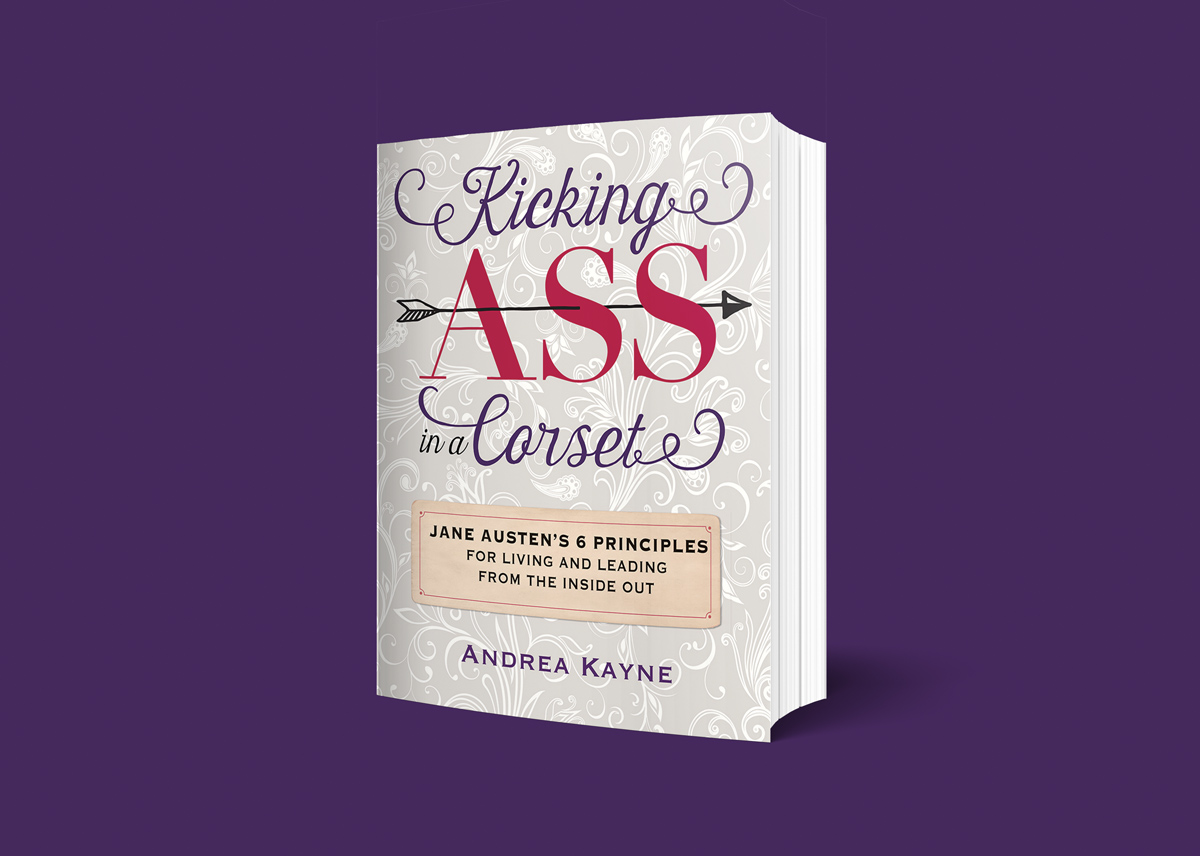
How Women Can Channel Their Inner Jane Austen to Overcome Leadership Constraints
t is a truth universally acknowledged that women in want of strong leadership skills often face difficulties in their endeavors.
Or so Jane Austen might say.
Thus, Andrea Kayne L’93, a self-described “complete Jane obsessive freak,” was delighted during a 2016 Jane Austen convention in Washington, D.C., when she had a revelation.
She was sitting in a restaurant with a fellow “Jane-ite” friend. “I told her Jane Austen just so crystallizes my interests in leadership and interests in women in corporate culture,” Kayne said of her “aha” moment. “Honestly, it was a back-of-the-napkin list.”
She’s referring to the list of Austen heroines she details in her book, Kicking Ass in a Corset: Jane Austen’s 6 Principles for Living and Leading from the Inside Out, to be published in September by The University of Iowa Press.
In Memoriam

ichard Aurel Sprague L’53 had a middle name that paid homage to an ancient Roman emperor/philosopher, and a lifelong love affair with the law and his role in it.
He envisioned every jury trial as a work of stagecraft, playing his part with zest over the course of seven highly visible decades. “When I first got into the courtroom, I realized it was like producing a play — and I’m the producer, the actor, the composer,” Sprague said in a 2009 interview with the Penn Law Journal.
When Mr. Sprague died April 3, 2021 at age 95, the Philadelphia Inquirer described him as “a towering figure in Philadelphia’s legal community who … established himself as one of the city’s, if not the nation’s, most preeminent attorneys.”
In a 1999 Philadelphia Magazine poll asking 1,000 members of the city’s Bar Association which attorneys they would seek out for legal help for various problems, Mr. Sprague outscored all competitors, garnering top honors in the greatest number of specialties.
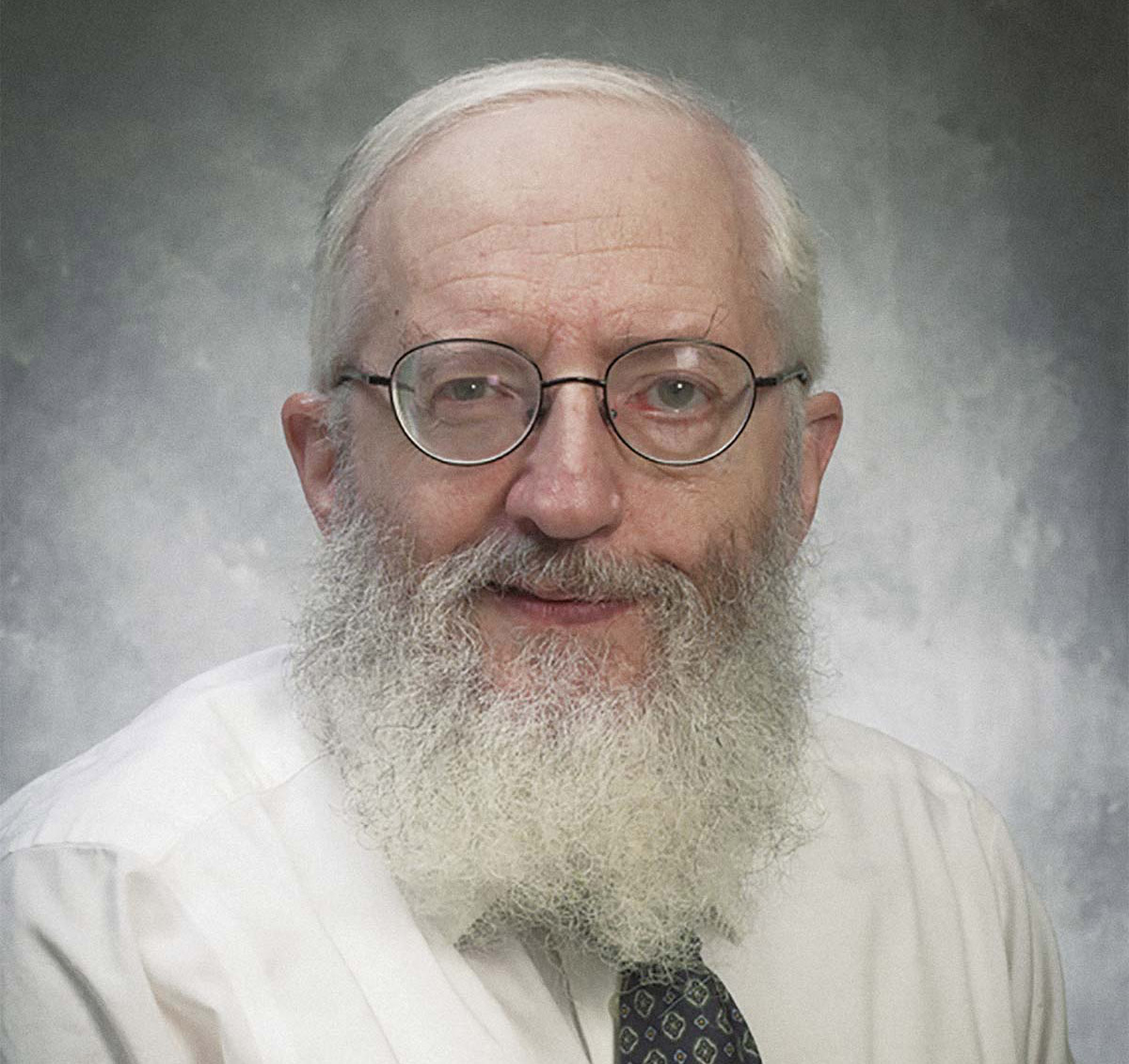
Professor Shakow Was a Man of Faith and a Meticulous Thinker and Teacher
lthough friends and colleagues said he would be too humble to admit it, Professor David Shakow was an exceptional teacher. The beloved professor taught tax law for decades at Penn Law, and as a man dedicated to his Orthodox Jewish faith, he taught weekly classes on the Talmud and other Jewish legal texts at his synagogue for many years.
“He carried himself more as a student, but he definitely was a teacher,” said Josh Weinberger L’99, who was both a law student and later a mentee of the professor. “He was always interested in learning from other people, … but at heart, he was a teacher, and a lot of people really benefited from his wisdom.”
Professor Shakow passed away in mid-January. He was 75.
Professor Shakow graduated from Harvard Law School in 1970 and took a clerkship with the Hon. William B. Hastie of the U.S. Court of Appeals for the Third Circuit. He then joined the New York law firm of Davis Polk and Wardwell, and in 1976, received an LLM in taxation from NYU Law School. Professor Shakow served in the Office of the Tax Legislative Counsel of the U.S. Department of Treasury before joining the Penn Law faculty in 1982.
Dr. Ronald Litman ML’18 left an incredible legacy in his 62 years, becoming a renowned expert on the safe administration of medicine.
Dr. Ronald S. Litman, Globally Recognized Pediatric Anesthesiologist and Tireless Champion of Penn Law’s Master in Law Program
r. Ronald S. Litman ML’18, an internationally recognized leader in pediatric anesthesiology at The Children’s Hospital of Philadelphia (CHOP) and staunch supporter of the Law School’s Master in Law program, passed away on April 21 after a short illness. He was 62.
A passionate advocate for the safe administration of medicine, Dr. Litman had been an attending anesthesiologist at The Children’s Hospital of Philadelphia for twenty years and a Professor of Anesthesiology at the University of Pennsylvania Perelman School of Medicine for the last thirteen years.
Noting his loss to the medical community and to Penn, Dr. Charles Dean Kurth, Anesthesiologist-in-Chief at The Children’s Hospital of Philadelphia, said in a statement: “We will miss Ron’s quick wit, keen eye, willingness to help at any moment, incredible knowledge and skill in pediatric anesthesia … Ron will be remembered as a giant in the field of pediatric anesthesia… . He had a gift for inquiry and scholarship and was amazingly productive. He used these gifts to positively influence the clinical care of children undergoing anesthesia, surgery, and pain management around the world.”
Ever the seeker of knowledge, in 2009 Dr. Litman acted on his interest in the law and approached Ted Ruger, before he became Dean, about sitting in on his class in Health Law. Ruger told him to take it for credit in case he wanted to pursue more legal education in the future.
Shirley Shils, Penn Law Philanthropist
hirley Shils PAR’77, CGS’84, CGS’90, G’93, who was involved in several philanthropic endeavors at Penn with her late husband Dr. Edward Shils W’36, G’37, GR’40, PAR’77, L’86, GL’90, GRL’97, died Feb. 1. She was 100 years old.
Like her husband, Mrs. Shils embraced education at all stages of life and earned undergraduate and master’s degrees at Penn in her 60s and 70s. She and Mr. Shils were deeply involved in many facets of the University of Pennsylvania. At the Law School, they established the annual Shils Lecture Series in Arbitration and Alternative Dispute Resolution in 1993. In 2001, they endowed the Edward B. Shils and Shirley R. Shils Term Professorship in Entrepreneurial Management at the University, following their establishment of the Edward B. and Shirley R. Shils Term Professorship in Arbitration and Alternative Dispute Resolution at the Law School.
In 2017, Penn Dental Medicine celebrated the opening of the Edward and Shirley Shils Clinic, a 55-chair restorative teaching clinic for predoctoral students.
Mrs. Shils served on the board and executive committee of the Madlyn and Leonard Abramson Center for Jewish Life, as Vice President of the Federation of Jewish Agencies of Greater Philadelphia, and as Chair of the Women’s Division of Philadelphia Allied Jewish Appeal’s Israeli Emergency Fund.
Mrs. Shils was preceded in death by her husband, Ed, who died in 2004. She is survived by children Ronnie Burak, Nancy Shils C’77, G’86, GED’98, GED’01, GRD’01, Edward Barry Shils; grandchildren Eli and Benjamin; and great-grandchildren Levon, Ani, Ariana and Eduardo.

